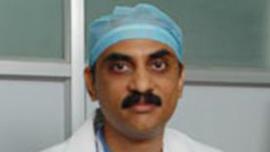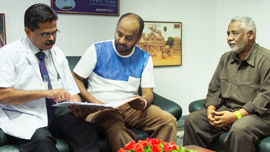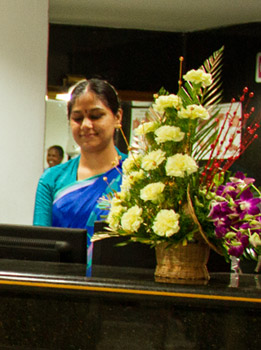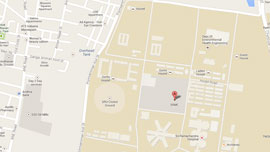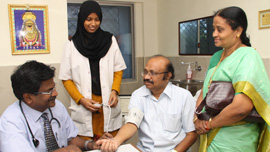Organ Transplant - A lifesaving Option
For Appointments
Call: 044- 45928500 Ext.349
Organ Donation Awareness

Organ Transplant - A lifesaving Option
We provide a unified, comprehensive approach to transplant patient care in each of our solid organ transplant programs. Through the use of the latest technology and research, we are able to provide our patients more lifesaving treatment options with the best possible outcomes.
In addition to the medical aspects of transplantation, there are many administrative, logistical and financial points for which you should be prepared. Prior to surgery, your loved ones should understand your wishes. The transplant process can be complicated and, for many individuals and their families, frightening. The staff at SRMC will be with you every step of the way, telling you what to expect next, and how to prepare for your experience.
The Process During Transplantation
Referral and Evalution
When patients are referred to be evaluated for a transplant, they will be assigned a transplant coordinator, who will facilitate communication between the patient and the transplant team through the entire transplant process. The patient will have a comprehensive evaluation by all members of our transplant team, including the transplant physicians, transplant surgeons, transplant nurse coordinators. Patients may also talk to dieticians, anesthesiologists, psychologists, social workers and financial coordinators. Appropriate lab and radiological testing also will be performed. Based on a thorough evaluation, the team will determine if the patient is a candidate for transplant.
Patient Listed & Awaiting Transplant
If liver transplantation is the best option for you and you agree, your name will be placed on a national waiting list based on your blood type, body size (height and weight) and medical urgency. The awaiting period for the listed patients in SRMC is short.
Transplantation
Once a potential matching donor organ is available for transplantation, a transplant coordinator will notify the patient to come to SRMC. A final round of testing will determine if the donor is a good match for the patient. If it is, the patient will undergo transplant surgery.
Your Stay After Transplant
After the Surgery the patients are carefully monitored in the immediate post-operative period.
Infection is a major concern for transplant recipients. The risk for infection is due primarily to the anti-rejection medications that are given to prevent and treat rejection. We will ask that anyone who has a cold, cough or other infection, and most children, not visit you. If you have any questions please ask a staff member. We may also take various “cultures” of body fluids to detect infection and to guide treatment with antibiotics. You will have pain in you incision(s). Your doctor will order medication for your pain. Over time your pain will decrease. You will receive injections or pills to help with the pain. You may not need any pain medicine by the time you go home. Your incision is held together by strong sutures. As your incision heals, the new skin will be strong.
Follow - Up After Transplantation
Once the patient is home, there will be regular contact with our transplant team, regular testing and periodic visits to SRMC for follow-up exams for continuity of care and to ensure the best outcomes, we follow our patients for the life of their transplant.
In the first few weeks after being discharged from the hospital, the patient will be return to the hospital frequently to be seen in our outpatient clinic.
Mental Health Services / Counseling
Our nurses and social workers will be helping you to get rid of emotions, stress through counseling.
Quitting the ill experience of anxiety and depression will tend to improve health. However, some find that these concerns, or others, may interfere with quality of life in the post-transplant period.






